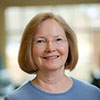This article is more than 5 years old.
On March 18, I attended the opening day keynote address for the Humanities Institute Spring Launch.
Dr. Edward Ayers, currently president of the University of Richmond, was the speaker. His is a familiar face to me since for many years he served as Hugh P. Kelly Professor of History and Dean of the College of Arts and Science at the University of Virginia, and he regularly wrote columns for the alumni magazine at UVA, where I received my M.A. His accomplishments and influence as an advocate for the humanities, specifically in digital and public humanities, are broad-ranging: an earlier online history project, The Valley of the Shadow: Two Communities in the American Civil War, remains a celebrated and honored digital archive of thousands of primary source materials from two communities, northern and southern, in Pennsylvania and Virginia during the Civil War. More recently, he has been co-hosting a public radio call-in show, BackStory with the American History Guys (which he described as “Car Talk” for American history buffs). He has also received a National Endowment for the Humanities grant for the NEH Digital Humanities program to support “Landscapes of the American Past: Visualizing Emancipation,” which will employ digital mapping in order to reveal where, when and how emancipation emerged from the Civil War as well as social changes that took place during that period.
The lecture itself examined the issue of innovation in the humanities. “What does America want from us,” he queried–“dog-eared volumes or new theories on post-anything?” He countered that humanists are always innovative, in the courses they teach and in the research and scholarship they conduct. He tracked the institutional embodiment of the humanities, given the fact that he has now “bitten the apple of administrative experience,” and traced the timeline of the humanities in academia and the various crises that have arisen. In the 1930s the humanities became part of institutional requirements and the post-war years were their golden age. The 1960s became a period of efflorescence for the humanities, with President Lyndon Johnson’s creation of the NEH and a marked increase in humanities degrees, which peaked in 1972. But by the1970s the job market for advanced degrees in the humanities began to disappear after years of saturation, and although the 1980s became another period of ascendance, albeit to a lesser degree, the relative position of the humanities has since then stabilized and remained largely the same for the past 20 years. However, the crisis of graduate students entering the job market is, in his words, “heartbreaking.” (And I was but a couple of rows behind two very long rows of Visiting Assistant Professors in the English Department, sitting collegially and staunchly together.) Ayers believes that there is no loss of interest in the humanities: the humanities, social sciences, and sciences each enroll approximately 18% of students and the proportion of English majors has remained relatively stable. But since humanists are famous for being resistant to change –because innovations have sometimes come at the expense of the humanities– we need to clarify the innovations we do desire. The golden age will not return. Humanists need to work with the social momentum of the times and to shape that momentum ourselves. He cited his experiences as an administrator, of hearing repeatedly from alumni who specifically remember a faculty member and a class, but conceded that some people remain impervious to our charms of nuanced critical and contextual thinking! In a time of multi-cultural and gender identity interests and awareness, and as internationalism ties together the various areas of the humanities, humanists need to get over any disdain for subjects taught on another floor of a building or the other side of the parking lot, and to realize that all teach profound, life-changing things. He noted at one point that libraries give access to the humanistic archive and that because of e-journals and other digital resources, humanists and the humanities enjoy a vaster audience. He then spent some time showing us the signature project of the Digital Scholarship Lab at the University of Richmond, which deals with the hidden patterns of the Civil War. This involves mapping Richmond’s slave market and digitizing some 3000 pages of the secession debate in Virginia, where slavery is mentioned more than 1000 times in the debates– thereby addressing the question of the extent to which the Civil War was about states’ rights or slavery. He deplored the fact that as we approach the 150th anniversary of the end of slavery, and freedom from perpetual bondage for 4 million people, there is no marking of it. Implicitly, this digital project is an information-rich marker.
Dr. Ayers was a very engaging and thought-provoking speaker, and it was personally interesting for me to see the personality behind the UVA magazine columns I read for so many years.

4 Comments on ‘Humanities Institute Spring Launch’
Beautifully written, Ellen. Ayers is heroic.
This is great Ellen! BackStory has been added to my podcasts!
Wonderful post. Thanks for this, Ellen. (And I’ve added the podcast to my iTunes, too!)
Thanks for the thoughtful posting. I learned a lot and the Hidden Patterns of the Civil Wars is fascinating: http://dsl.richmond.edu/civilwar/